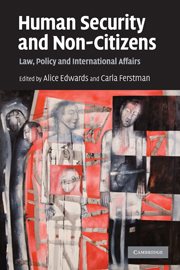Book contents
- Frontmatter
- Contents
- About the editors
- About the contributors
- Preface
- Acknowledgements
- Part I Human security, human rights and human dignity
- Part II Physical and legal security, armed conflict and refuge
- Part III Migration, development and environment
- Part IV National security and the ‘war on terror’
- 12 A distinction with a legal difference: the consequences of non-citizenship in the ‘war on terror’
- 13 Immigration law enforcement after 9/11 and human rights
- 14 Protection of non-citizens against removal under international human rights law
- 15 The human security framework and counter-terrorism: examining the rhetoric relating to ‘extraordinary renditions’
- 16 Legal routes to restoring individual rights at Guantanamo Bay: the effectiveness of habeas corpus applications and efforts to obtain diplomatic protection
- Index
16 - Legal routes to restoring individual rights at Guantanamo Bay: the effectiveness of habeas corpus applications and efforts to obtain diplomatic protection
Published online by Cambridge University Press: 17 February 2011
- Frontmatter
- Contents
- About the editors
- About the contributors
- Preface
- Acknowledgements
- Part I Human security, human rights and human dignity
- Part II Physical and legal security, armed conflict and refuge
- Part III Migration, development and environment
- Part IV National security and the ‘war on terror’
- 12 A distinction with a legal difference: the consequences of non-citizenship in the ‘war on terror’
- 13 Immigration law enforcement after 9/11 and human rights
- 14 Protection of non-citizens against removal under international human rights law
- 15 The human security framework and counter-terrorism: examining the rhetoric relating to ‘extraordinary renditions’
- 16 Legal routes to restoring individual rights at Guantanamo Bay: the effectiveness of habeas corpus applications and efforts to obtain diplomatic protection
- Index
Summary
Introduction
On entering office in January 2001, the George W. Bush administration adopted a form of exceptionalism which one commentator describes as ‘the traditional view that security was fundamentally determined by the military means of sovereign states, [it] sought to promote “a distinctly American internationalism”’. Nine months later, the attacks of 9/11 intensified this approach to national security under the rubric of what the United States later termed ‘the war on terror’. The attacks not only impacted the US security landscape but also generated a new global security agenda at the international and multilateral levels with the United Nations' Security Council adopting a series of measures mandating states to take a range of counterterrorism measures; and states joining a US-led global coalition against terrorism. While these initiatives emphasised the urgency and priority of global security, none explicitly addressed states' pre-existing human rights obligations or considered the human security implications of the strategies involved.
The US administration specifically couched its response to the attacks of 9/11 in moralistic tones, dividing the world into those ‘against’ and those ‘with’ the United States and characterising the ‘war on terror’ as one of ‘good’ against ‘evil’. The rhetoric employed focused on the objective of protecting democracy and the ‘free world’, without confirmation that the means used to combat terrorism would adhere to the values embedded in democracy.
- Type
- Chapter
- Information
- Human Security and Non-CitizensLaw, Policy and International Affairs, pp. 560 - 588Publisher: Cambridge University PressPrint publication year: 2010

